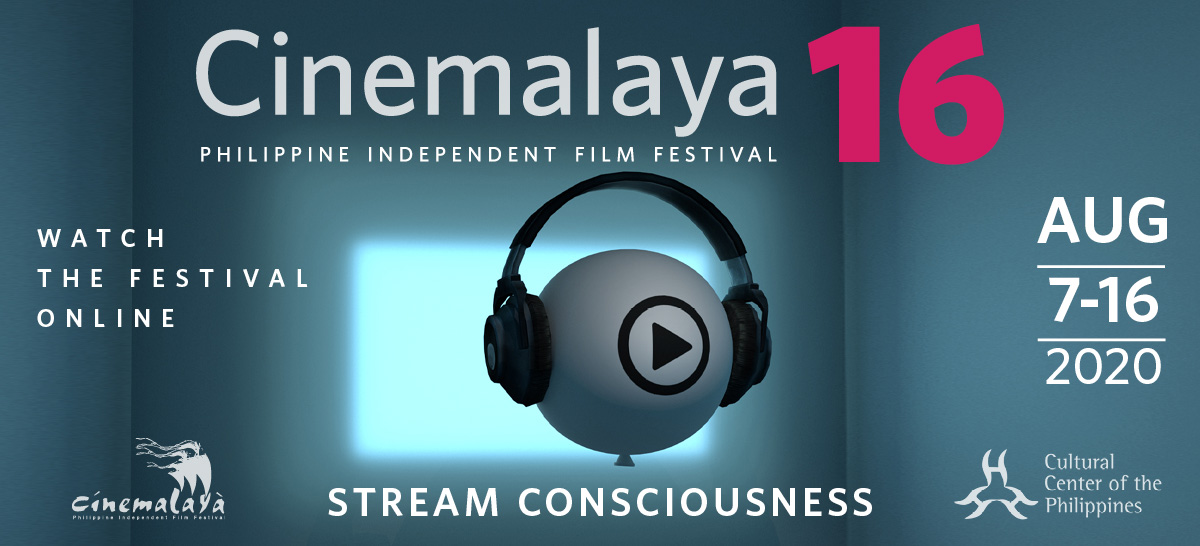In a historic first, the 16th Cinemalaya Philippine Independent Film Festival welcomes us to Stream Consciousness, ushering in the dawn of local virtual film festivals. As the pioneering film festival takes the virtual platform amidst the ongoing community lockdown, we’re reeling in a whole new experience of traversing the intimacy of theater houses back to our homes by finding value in the essence of films.
It was March of this year when the Cinemalaya committee announced the resumption of the 2020 competition, following a difficult decision of skipping this year’s full-length features, and eventually putting the short feature films up for its main competition. Strategically considering the necessary restrictions imposed by Manila’s lockdown, we’re mincing every detail that led to this historic shift in platforms and how it’s trajected towards the long run.
Chris Millado, Cultural Center of the Philippines’ Vice President and Artistic Director, brings us back to the history of Cinemalaya to show us that it has always been clamped on a digital venture.
In the virtual press conference of the event, he reiterated on how digital filmmaking paved the way for pioneering filmmakers to produce in more practical, cheaper ways. With the many possibilities that opened for aspiring and even veteran filmmakers, the transition to online platforms is a way to move forward. “It’s always been in the future plans of Cinemalaya to move much of its experiences online and this situation has only sped up the migration,” he expresses.

But while he noted on the missing experiences of intimacy and shared experiences among peers and enthusiasts in a festival, he’s hoping that this year’s temporary shift would work as an enhancement on screenings until enthusiasts, fans, and students alike, can finally come back and relive the classic, traditional festivities that Cinemalaya has consistently offered through the years.
Laurice Guillen, Cinemalaya Foundation President, sheds light on the primary notions and questions that abound in this year’s theme Stream Consciousness in regards to its necessary transition during these challenging times.
Thrust into a situation that held us up at our homes without access to theater houses, Cinemalaya sets its sails to prove how its evolution sways us back to the core of films to understand how content progresses at the face of reality and society. She starts off saying, “Content is a prime commodity. It means that we should continue to make films now more than ever.”
People consume films essentially for both entertainment and to keep its culture alive because in a way, they hold shards of truth about the society. With productions on hold for most parts of the world with limitations that hinder shooting in external locations along with mass gathering prohibitions, this only calls for evolutionary measures to keep up with the demands of the new normal and its consumers.
“This present setback is a time to study what is the future content, specifically [for the] Philippines. Will this be the new trend in films to come? Does it mean for us to capture the mood and essence of this time so that our future films will be coming from a place of our present consciousness?” she challenges.
Finally capping with a message for filmmakers, “How have [I] grown in consciousness from this present crisis? What is my perception of the world around me? Both physically and virtually in my own mind.” Hearing her weave a series of insights on how content is cultivated, we’re getting a glimpse on how content mirrors a person’s consciousness based on how society and one’s own experiences condition the mind. This follows how it should translate to and be consumed by future audiences.
Onto the new format, Cinemalaya 16 celebrates short films as a genre. As it headlines this year’s most prestigious local independent film festival, its Competition and Monitoring Chairperson, Jose Javier Reyes, runs us through three mantras that keep him on track even at the face of this indefinite quarantine situation.
First, “Accept”. It’s high time we accept the pandemic and the changes and impact it brought to our lives. This extends from the limitations of production to the business side considering that most theater houses and public entertainment venues will be closing their curtains for a while.
Then we “Adapt”. To accept is one thing, but to adapt is to move forward. Finding new ways to produce and be economically viable in the face of challenges are just some traits of a good director. Seeing as how streaming is a safer channel of distribution to ensure public safety today, it’s become the most adaptable platform for films.
Lastly, “Advance”. The acclaimed director pivots on how the quarantine changed the audiences’ values and perspectives in mortality and vulnerability. Seeking that silver lining in the midst of a crisis just challenges how one can translate stories in beautiful theatrics.
It’s a major shift and at its bosom lies the query of readiness of the audience and its pioneering filmmakers. Sonny Calvento, director of Excuse Me, Miss, Miss, Miss, shares, “Feeling ko ngayon mas importanteng time especially mas malawak ang audiences given na almost everyone is stuck sa mga bahay. The fact na Cinemalaya yung magma-mount ng ganitong platform, ay malaking honor kasi iniisip nila ang best for us, filmmakers.” For Utwas directors, Richard Salvadico and Arlie Sweet Sumagaysay, they express, “Pandemic or not, it’s still Cinemalaya.”
Cinemalaya’s prestige only proves that it still remains a resounding inspiration for aspiring filmmakers and even more so now that it comes with a pioneering reputation to be a part of its transition.
On the part of programmers, they dig deeper on the core of filmmaking as a passion over basking on the glory of the festivities. Mae Caralde of the Gawad team shares how the committee persevered to realign their budget and efforts to keep the festival running. “Ang assurance lang na magsu-survive ang film industry is for the filmmakers to do what they love to do. Tuloy po ang sining sa CCP,” she expresses.
For Reyes, he clarifies on the role of filmmakers as artists despite and in spite of festivities. “It’s true that there’s such euphoria when you go to a gala premiere and the main theater [while] it’s full of people and all your supporters surrounding you. But that’s not the point.” He continues, “As a filmmaker, it’s for you to share your film in whatever platform they may be. I hope that you become a filmmaker because you have something to share and not because you want to be a rockstar.”
Introducing these year’s Short Film Finalists that are challenging the tides of the new normal and trailblazing the dawn of local virtual film festival experience:
Ang Gasgas na Plaka ni Lolo Bert (The Broken Vinyl Record) by Janina Gacosta and Cheska Marfori
A closeted gay man in his 60s has been living with HIV for 10 years. His monotonous life takes a sudden turn when he receives an old vinyl record from his dead ex-lover.
Ang Pagpakalma sa Unos (To Calm the Pig Inside) by Joanna Vasquez Arong
To Calm the Pig Inside is a contemplation on the effects a typhoon leaves on a seaside city. Myths are woven in to try to understand how people cope with the devastation and trauma. A girl’s voice divulges bits and pieces of her own memory of her grandmother and mother to tie in the experiences she felt visiting this ravaged port city.
Excuse Me Miss, Miss, Miss by Sonny Calvento
Vangie, a miserable contractual sales lady, is about to lose her job. But in her desperate attempt to convince her boss not to sack her, Vangie uncovers the ultimate jaw-dropping secret to regularization. The film is a social satire about the plight of contractual workers in the Philippines.
Fatigued by James Mayo
One night, you overslept because of too much work, now, you must wake up before your nightmare becomes a reality.
Living Things by Martika Ramirez Escobar
Kints wakes up and discovers that her decade-long lover Charles has turned into a cardboard standee of himself.
Pabasa Kan Pasyon by Hubert Tibi
Religion and economy take center stage in a Bicolano family’s story, set during the Lenten season. To make ends meet, one of them turns to religion, and pushes his mother to make a living off her faith.
Tokwifi by Carla Pulido Ocampo
A 1950s mestiza star, trapped inside a television that fell from the sky – dreams up a romantic romp with a Bontok Igorot man who does not know how to kiss.
Utwas (Arise) by Richard Salvadico and Arlie Sweet Sumagaysay
Toto discovers more of the ocean as he tries to learn how to dive and fish.
The Slums by Jan Andrei Cobey
A documentary team progressively intervenes and trespasses into the lives of a poor family living in the slums as they try to cope with the loss of their TV.
Quing Lalam Ning Aldo (Under the Sun) by Reeden Fajardo
A transgender sampaguita farmer decided to renovate their neglected kitchen as soon as she heard that her son is going home.
Aside from the main competition, Cinemalaya will also have a specially-curated roster of Short Films in Exhibition, featuring 20 short films namely: Ang Meron Sa Wala (Beyond Nothing) by Arby and Christine Larano; Ang Nawalang Haligi (Pillar) by Sarah Mya Regacho; Dama De Noche by Lawrence Sibug; Grand Gestures by Cody Abad; Gulis (LINES) by Kyle Jumayne Francisco; Habak by Paolo Matibag and Mia Salisbury; Himagsik ng Hiwaga (Revolt of the Mystic) by Geoffrey Solidum; Igib by Joey Paras; Jepoy by Avid Liongoren; Kung Saan Patag Ang Bundok (Where The Horizon Meets The Mountain) by Dolliete Echon; OctoGod by Shievar Olegario; Paon by Seb Valdez; Pinakanakapagpapabagabag-Damdamin (Most Disturbing Feeling) by Jermaine Tulbo; Si Gloria at Si Juan by Gilliano Salvador; Sumasaiyo, (Yours truly) by Jermaine Tulbo; Tarang (Life’s Pedal) by Arvin Alindogan Belarmino; and The Rooftop by Avirup Biswas.
Aside from the main competition, the event also slated to include several programs including Gawad Alternatibo; partnerships with ABS-CBN through iWanTV, TFC Global, and ABS-CBN Film Archive for the screening of their Film Restoration Project title, Minsa’y Isang Gamu-Gamo; Cinemalaya Webinars; Ricky Lee’s Scriptwriting Masterclass; Tara, chat! will then replace Talkbacks with filmmakers, cast, and crew; Kumu partnership as official livestream partner; Tribute to commemorate the loss of industry pillars and prides, Peque Gallaga and Anita Linda; Allied Festivals in partnership with Eigasai and CinEuropa; Dokyu; Cinemalaya Retro for festival classics; and Cinemalaya Campus 2019 winners showcase.
These main entries can be viewed by renting online via Vimeo in bundles. Viewers may also purchase over 100 short films and 20 full-length features and over 20 webinars for as low as ₱75 (which gives you access to five films), while the whole experience is priced at ₱350. After the two-week festival, competition films and select titles are slated to be available locally via streaming platform iWant, and eventually the global TFC channel.
For more information and to purchase tickets, visit www.cinemalaya.org


